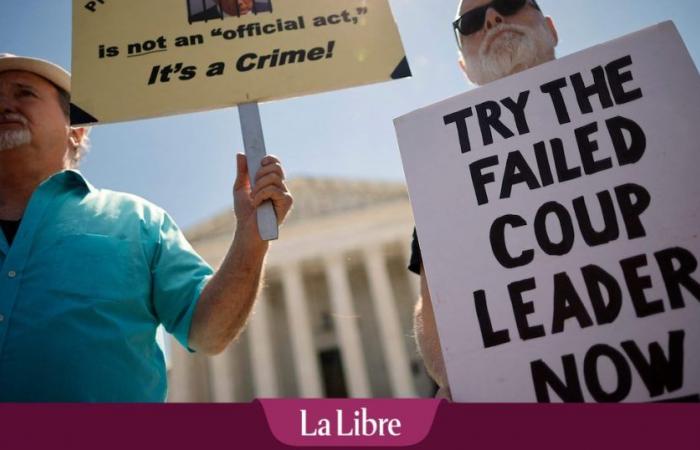In a highly anticipated ruling, the US Supreme Court ruled Monday, by a vote of 6 to 3, that the US president enjoys “absolute” immunity for clearly official acts performed in the exercise of his functions, but none for unofficial acts. The Court was called upon to rule on Donald Trump’s request for immunity to exempt him from any responsibility for the contestation of the 2020 election results and, in particular, for the storming of the Capitol. It thereby refers to the lower courts, which had ruled out immunity, the task of determining when and how Donald Trump will be tried.
This judgment has historic significance insofar as it helps to define the limits of presidential power. The Court, which was seized on April 25, is nonetheless criticized for the slowness with which it examined this case. We recall that in other times, she could be more eager to resolve the most serious questions.
In June 1971, for example, it took only four days, after the oral arguments, to prohibit the Nixon administration from blocking the publication by the New York Times of the Pentagon Papers on the secret history of the Vietnam War. Three years later, in July 1974, it took sixteen days to force the same administration to hand over to Congress the no less famous secret recordings that would precipitate the President’s downfall in the Watergate scandal. Closer to home, in the weeks following the memorable presidential election of 2000, the Supreme Court needed only twenty-four hours to decide to stop the recount of the ballots in Florida, thereby sending George W. Bush to the White House.
Let voters have their say first
From there to thinking that the conservative majority of the Supreme Court knowingly dragged its feet to help Donald Trump, there is only one step, all the more quickly taken since we know that three of the nine judges were appointed by the former President. Certainly, the Court has shown on more than one occasion its desire for independence. Nevertheless, in the present case, by taking its time, it has de facto granted the Republican candidate the immunity he was seeking, by stopping the judicial clock and by postponing indefinitely the trials against him, in Washington and Georgia.
A simple consequence of the multiplicity of appeals, or a deliberate strategy, also linked to the embarrassment caused by an unprecedented situation? It could, in fact, seem delicate to take decisions that would have resulted in excluding a candidate from the presidential election, especially the one who is the favorite. It could therefore have been convenient to let the voters express themselves beforehand, by postponing the legal deadlines.
In any case, the late ruling on presidential immunity will most likely have the effect of preventing, for practical reasons, any further appearance in court by Donald Trump before the November 5 election – the delays seem far too long. short. And, if he were to be elected, the defendant would thus benefit from a four-year reprieve. Will we then imagine judging a former President in 2029, at the earliest, for having “plotted against the United States of America” in 2020? Under these conditions, the trial which resulted in Donald Trump being convicted last month in connection with secret payments to porn actress Stormy Daniels could well remain the only one. The sentence will be pronounced on July 11.






